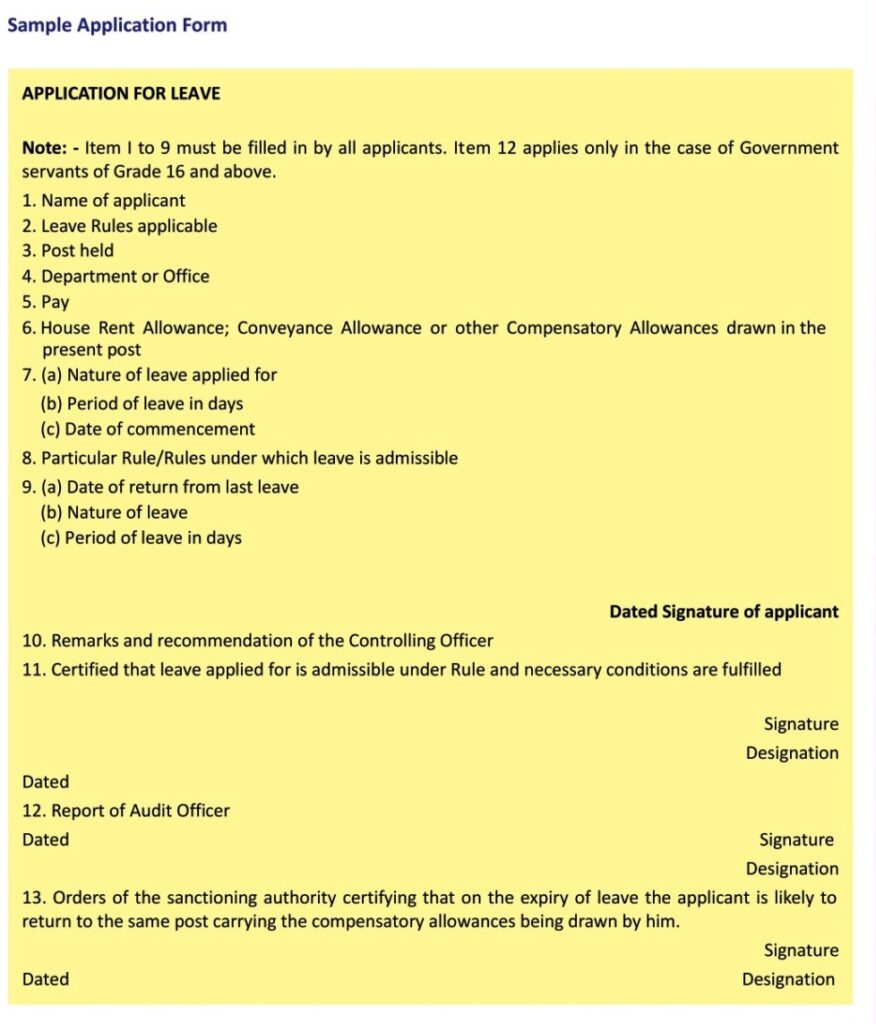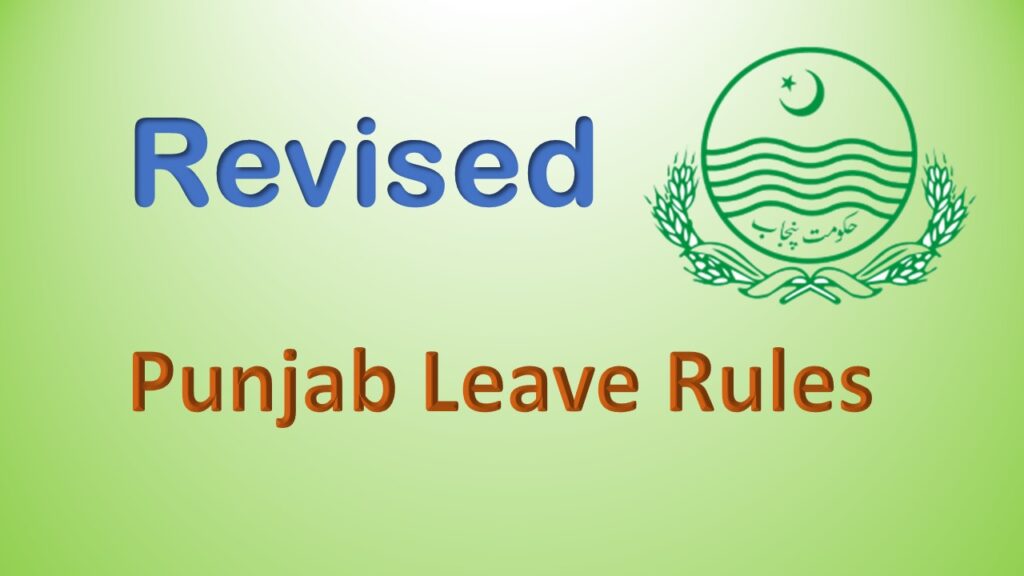The Civil Servants (CS), during their service, have some time to avail leave due to illness or some personal affairs. Leave is earned by the Government Servants for the period of duty only. Leave cannot be claimed as a matter of right. To deal with these issues knowledge of the relevant Leave rules is mandatory.
Note: Duty period of 15 days or less in a calendar month will be ignored for the purpose of earning leave and more than 15 days considered as a full month.
Earning and Accumulation of Leave
A civil servant in non-vacation department earns leave on full pay at the rate of 4 days per calendar month of duty rendered.
If a civil servant proceeds on leave during a calendar month and returns from it during and other calendar month and the period of duty is more than 15 days in either month, the leave to be credited for both the incomplete months shall be restricted to that admissible for one full month only. There is no maximum limit on accumulation of leave.
Leave Application, Procedure and Consideration for its sanction, etc.
An application for leave on prescribed format must he made to the head of the office or authorized person to the extent of Leave due and admissible shall be stated in the application.
When a CS submits a medical certificate for the grant of leave, it shall be issued/ signed by the authorized medical attendant. Leave as admissible to CS may be sanctioned by the appointing authority / authorized officer.
In case where all the applications for leave cannot, in the interest of public service, be sanctioned, the authority shall consider the following in deciding the priority of the applications.
- Whether and how many applicants are, for the time being, best be spared?
- Whether any applicants were recalled compulsorily from leave previously?
- Whether any applicants were required to make adjustment in the timing of their leave on the last occasion?
Civil Servants in Vacation Department
A Civil servant in Vacation department may earn leave on full pay:
- when he avails himself of full vacation in a calendar year at the rate of one day for every calendar month of duty rendered
- when he is prevented from availing himself of full vacation for that year at the rate as for civil servant in the non-vacation department
- when he avails himself of only part of the vacation – as in (a) above plus such a proportion of 30 days as the number of days of vacation not taken, bears to the full vacation
Leave on full pay
The maximum period of leave on full pay that may be granted at one time shall be as follows:
- Without a medical certificate 120 days
- With medical certificate 180 days
- On medical certificate from leave account- 365 days in entire service
Leave on half pay
- Leave on full pay may be converted into leave on half pay
- There shall be no limit on the grant of leave on half pay so long as it is available by conversion in the leave account
- Leave shall be applied for in terms of days
Types of Leave
Extraordinary Leave (leave without pay)
It may be granted on any ground to a maximum period of 5 years at a time, provided the civil servant has been in continuous service for a period of not less than 10 years. If service is less than 10 years, leave without pay may be granted for maximum of 2 years at the discretion of the head of the office. Maximum period of 5 years shall be reduced by the period of leave on full pay or half pay if granted in combination with EOL.
Recreation Leave
15 days in any one year – debit to the leave account may be for 10 days on full pay, provided that leave shall not be admissible to a CS in a vacation department.
Leave not due
- Leave not due may be granted on full pay – (to be offset against leave to be earned in future)
- For first 5 years of service – should not exceed 90 days
- For the entire service – to a maximum of 365 days
- such leave may be converted into leave on half pay
d. Such leave may only be granted when there are reasonable chances of the CS to resume duty
e. Such leave should only be granted sparingly, and not to temporary employees.
Special Leave (Iddit Period)
- A female civil servant, on the death of her husband, may be granted leave on full pay, when applied for, for a period not exceeding 130 days
- Such leave shall not to be debited to her leave account
- Shall commence from the date of death of her husband – death certificate required
Maternity / Paternity Leave
- May be granted, outside the leave account, on full pay to the extent of 90 days in all immediately before or after the birth of child.
- May not be granted for more than 3 times in the entire service, except for a female civil servant in vacation department who may be granted ML without this restriction
- For confinements beyond the third one, the female CS in the non-vacation department would have to take leave from the leave account
- May be granted in continuation of or combination with any other kind of leave
- A male civil servant, seven days be granted paternity leave on full pay outside his leave account on or immediately before the birth of his child extant to only two times during entire service.
- Immediate incharge is sanctioning authority of maternity or paternity leave.
Disability Leave
- May be granted up to a maximum of 720 days to a CS disabled by injury, ailment or disease contracted in the course of duty or official position, outside leave account
- First 180 days on full pay – on half pay for the remaining period
Leave ex-Pakistan
a. May be granted on full pay, if due.
Leave preparatory to retirement (LPR)
- Maximum period for which a civil servant can be granted LPR is 365 days
- Such leave can be taken subject to availability, either on full pay or partly on full pay and partly on half pay or entirely on half pay at the discretion of the civil servant.
Encashment of leave preparatory to retirement
- Retirement on superannuation or voluntary retirement on completion of 26 years qualifying service
- Lump sum leave pay for LPR subject to a maximum of 365 days leave on full pay (with effect from 01-09-2013)
- Such leave can be refused (in public interest) partly and sanctioned partly but the cash compensation shall be admissible for the actual period of such leave so refused, not exceeding 365 days.
- Either in lump sum at retirement or otherwise
- If CS dies before completing 365 days of such leave the family will be entitled to a lump sum payment equal to the period falling short of 365 days
- A civil servant may fifteen months before the date of superannuation or thirty years qualifying service, at his option, be allowed to en-cash his LPR if he undertakes in writing to perform duty in lieu of the whole period of 365 days or lesser period which is due and admissible.
- If a civil servant does not exercise the option within the specified period he / she shall be deemed to have opted for the encashment of LPR.
- In lieu of such leave, leave pay may be claimed for the actual period of such leave subject to a maximum of 365 days.
In-service death
- If a CS dies or is declared permanently incapacitated for further service by a Medical Board, a lump sum payment equal to leave pay up to 365 days out of the leave to her/his credit shall be made to the family as defined under Family Pension
- Senior Post Allowance will be included
Reasons for leave need not to be specified
- i. It shall not be necessary to specify the reasons for which leave has been applied so long as leave is due and is admissible to the CS provided that for medical leave the authority competent to sanction the leave may, at its discretion, secure a second medical opinion by requesting the Civil Surgeon or Medical Board.
- ii. Leave on medical certificate will not be refused.
Leave – when it starts and ends:
- Start – w.e.f. the day following the day when the CS hands over his/her charge of the post
- Ends – w.e.f. the day preceding that on which CS resumes duty
Re-Call from Leave
If called back with the personal approval of the Head office. He/ she may be granted a single return fare plus Daily Allowance.
Over stay after sanctioned leave
Unless extended by Head of office, a CS absent after the end of the leave – no remuneration will be paid and double the period of’ absence will be debited against the leave account, without any prejudice to any disciplinary action that may be taken against him.
Choice for the type of leave
Any type of leave may be applied for which is due, and it shall not be refused on the grounds that another type of leave should be taken in the particular circumstances.
Combination of different types of leave
One type of’ leave may be combined with joining time or with any other type of leave otherwise admissible – but LPR shall not be combined with any other kind of leave.
Return to Duty
A CS may not return to duty before the expiry of the period of leave granted to her/him unless permitted to do so by the authority.
Handing over charge
A CS proceeding on leave shall hand over the charge of’ the post, and if grade 16 and above, while handing over will sign the charge relinquishment report.
Assumption of charge
- i. Report to the authority that sanctioned leaves and take up charge of the post on return from leave.
- ii. If asked to take charge at another post travel expenses will be paid.
Leave Account
- i. Account Office shall maintain Leave Account of the CS of BS-16 and above
- ii. Leave account will be maintained as part of the Civil Servants Service Book of BS-01 to BS-15
- iii. Leave to lapse when a CS quits the service.
Pay during the leave
- i. Leave salary during the leave period on full pay shall be calculated at the rate equal to the pay drawn by him before commencement of leave. When leave is taken on half pay; the amount calculated shall be at a rate equal to half of that.
- ii. A Civil Servant is entitled to the revised rate of pay if a general revision in pay takes place or an
annual increment occurs during period of leave of the Civil Servant.
Station Leave
A civil servant shall not leave his/her station without permission of his authority/immediate
superior officer even during holidays
Civil Service Rules (CSR) Punjab Volume I, Part 1
Casual Leave Rules (Rule 8.62 to, appendix 17)
- Casual Leave (CL) should not ordinarily exceed 10 days at a time and 25 days during any one calendar year.
- The sanctioning authority may, however, grant CL upto 15 days in special circumstances.
- It may be granted in conjunction with Sundays or public holidays but not with any other kind of leave or joining time.
- Government servants are not entitled to CL as of right.
Hospital Leave (Rule 8.89)
- Medical treatment for illness or injury due to risks in incurred in course of official duties
- Particular classes of government servants
- Not debited against leave account
- Not exceed six months in term of three years
- Full pay for first three months and half pay after there
Study Leave (Rules 8.86 and 8.129, appendix 20)
- For higher study of scientific, technical and professional in relevant field
- Maximum four years in entire service
- At least five years’ service – not allowed three years prior to retirement
- Full pay for PhD course
Study Leave Sanctioning Authorities
- UptoBS-15 DDI(EE) Punjab
- BS-16to BS-17 DDI(SE)Punjab
- BS-18 and above Secretary, School Education Department
References:
- The Revised Leave Rules, 1981
- Notification No. FD.SR.II-9-10/2012 dated 30-10-2012 & 31-10-2012
- Notification No. FD.SR.II-2-141/2012 dated 09-09-2013
- The Punjab Civil Servants Act, 1974 (Section 17)
- Civil Service Rules Punjab (CSR) Volume I, Part I





